- Only bring your lunch to work when you have super-healthy leftovers. Then, as you’re beaming over your quinoa-and-kale concoction, glance at a colleague’s fare and comment, “I used to eat things like that.”
- Ask your coworkers questions about their research on Ezra Pound or David Foster Wallace when their mouths are full. As they are rushing to swallow and share, change course and launch into your latest abstract.
- Make a big deal of parceling out your garbage into the various recyclable bins. Smile pityingly when a colleague puts an item in the wrong one. Round it out by trashing the new environmental humanities hire.
- Drop each of the following terms during one meal: sustainable, small-batch, Proustian, plant-based protein, Pantagruelian.
- As she munches on French fries, tell your coworker with the autoimmune disease all about how an anti-inflammatory diet might really, really help her if she just commits to it.
- Loudly announce that you’ve already turned around the sixty Comp 101 papers that were handed in three days ago.
- On religious holidays of any sect, discourse on Caroline Walker Bynum’s work on holy fasts in medieval Europe as your coworkers are enjoying their sandwiches. Remark on how privileged we are to live in a post-agrarian society as you forego food yourself—not out of religious principles but because of the many promising studies on calorie restriction, which you hasten to recap.
- Clean up your area when you are finished eating, but only your area—exquisitely.
- Steal all the forks. It’s canonical.
Author Archives: Cynthia Gralla
The Real Bodies Suffering from Trump’s Obsession with Hydroxychloroquine
Since mid-March, and after nudges from red-pilled Elon Musk and Oracle CTO Larry Ellison, Trump has been hawking the antimalarial drug hydroxychloroquine (sold under the brand name Plaquenil) as a coronavirus miracle cure despite little concrete evidence to support his claims. He is right about one thing, though. For many people with systemic lupus and rheumatoid arthritis, hydroxychloroquine is truly miraculous.
It has been for me. I’m one of those “with architecture primed for ruin,” in the words of poet Fady Joudah. Three and a half years ago, I was diagnosed with systemic lupus while teaching literature and creative writing in Kofu, Japan. The immune system of a person with lupus turns against her, attacking internal organs, joints, and/or skin; the disease is named after a rash common among its victims, said to resemble a wolf’s face.
Five Classical Japanese Tanka for Lovers in Pandemics
We’ll weep into sleeves
Of richly patterned brocade
Beneath the full moon.
As the cherry blossoms fall,
Just don’t sneeze on me, okay?
Behind paper screens
You are barely visible.
It’s not a bad thing—
Distance will inflame desire.
No, really, stay over there.
The warbler wakes us.
As you dress, I ink a poem:
Love’s color may fade,
But I won’t forget the one
Who leaves hand sanitizer.
Sheltering in place,
We play the koto for days.
I’ll self-isolate
In the wisteria room.
You are getting on my nerves.
Summer irises . . .
Tweeting like the nightingale,
Our emperor claims
This warmth will banish the plague
Caused by Mongols or Chinese.
Copyright © Cynthia Gralla, 2020
Translating COVID-19
Social distancing. Flattening the curve. Sheltering in place. Lockdowns. R naughts. My vocabulary has exploded along with my stress levels these past few weeks. In addition, I had the grim pleasure of seeing the world introduced to “hydroxychloroquine,” a word I know all too well because this medication keeps my immune system from killing me.
Illness always changes language, just as the language we use for diseases colors our understanding of the world and people around us. Terminology encodes stigma as well as our hopes for assessment, understanding, and healing. This stigma runs deep. I’m convinced, in fact, that illness is the final taboo among otherwise enlightened people. No serious university will refuse to hire someone because of their sexuality, gender identification, race, ethnicity, or physical ability. But what if a hiring committee were to find out about someone’s history of mental or physical chronic illness? Unfortunately, I think such a history would make many otherwise smart people pause.
About Addiction
Here’s another of my seventh-grade essays. Incontrovertible proof that I was wiser at 12 than 32.
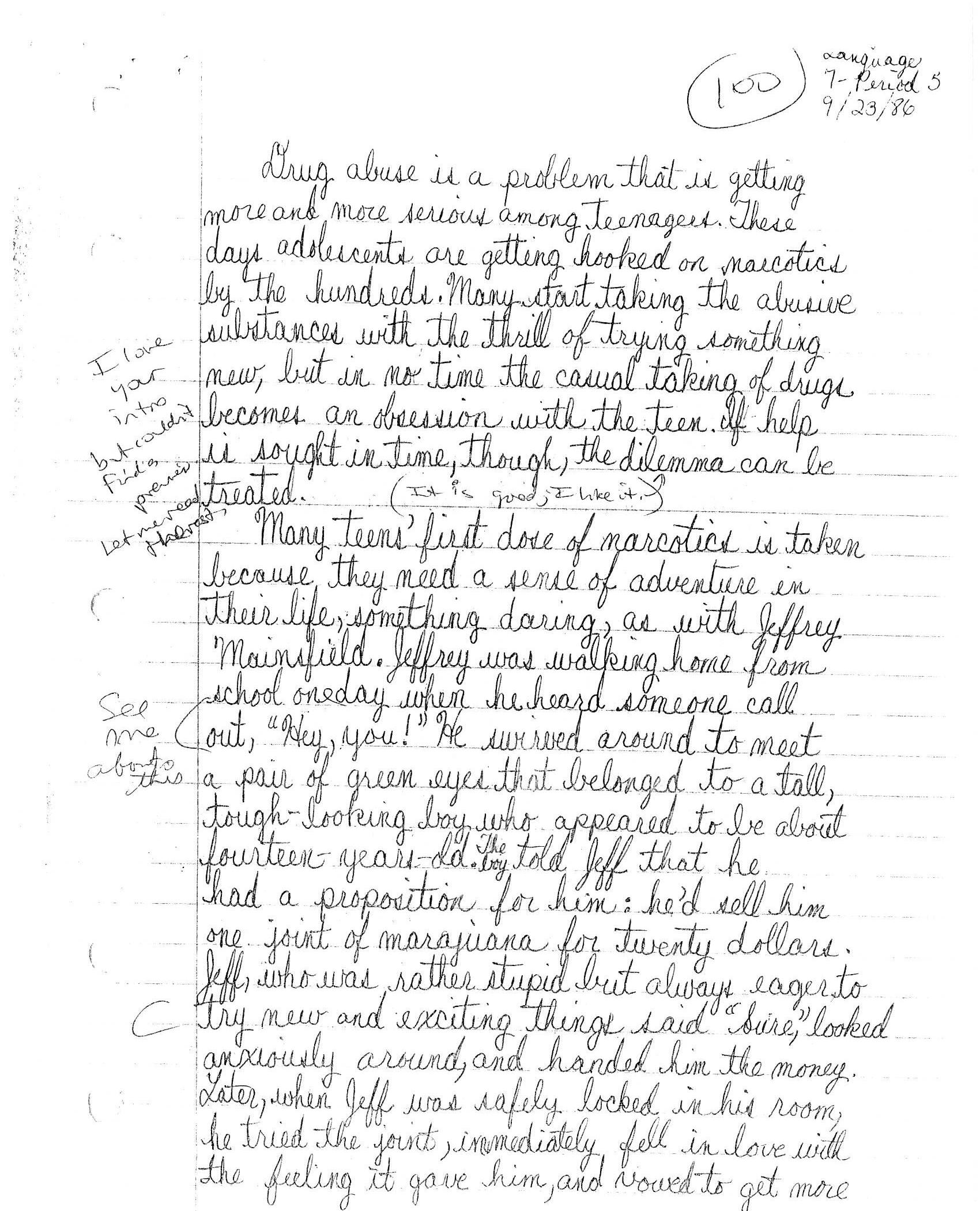
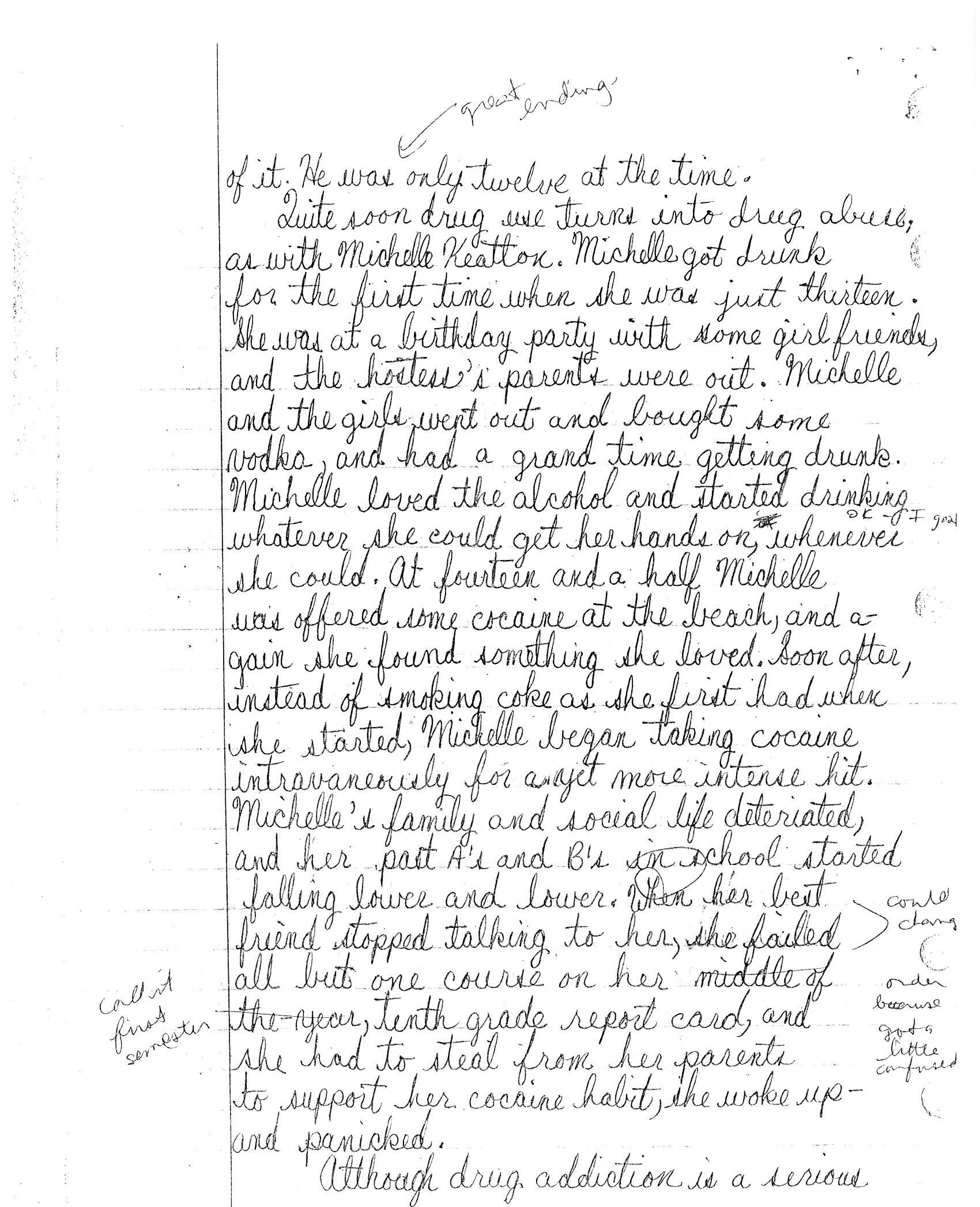
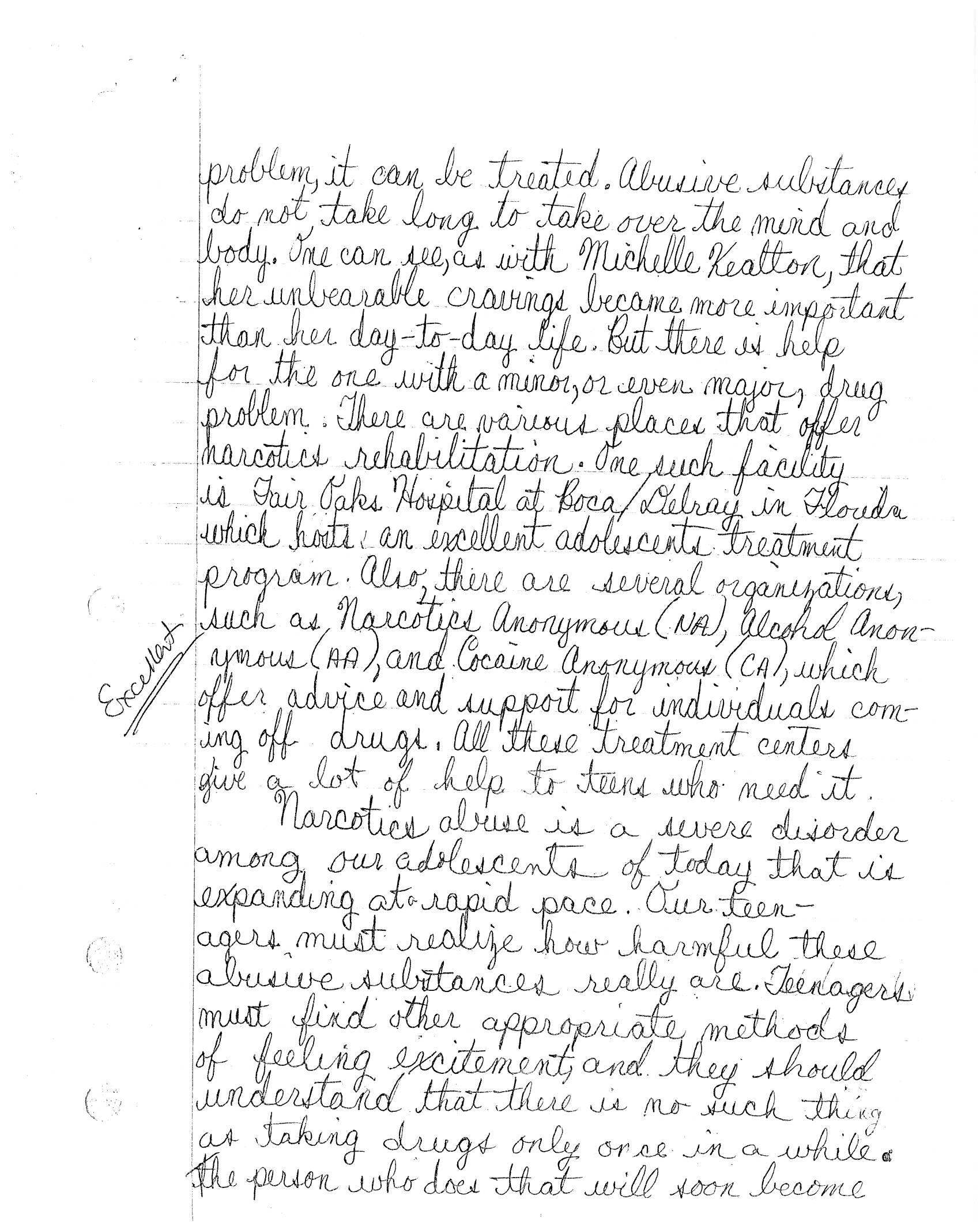
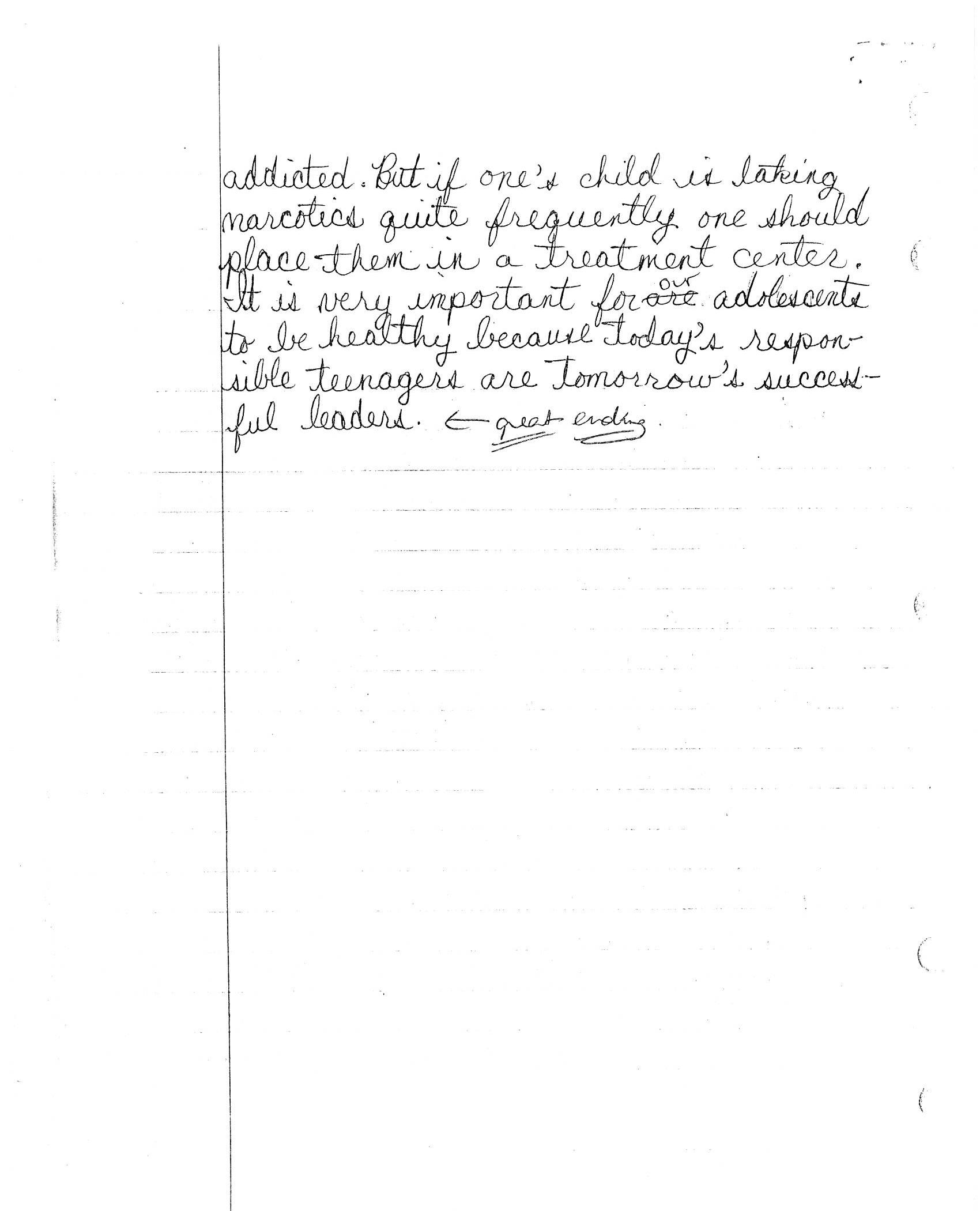
Copyright © Cynthia Gralla, 2020
The Wolf Tale: How a Disease Was Born
Giselle’s grandfather told her tales of a huge white wolf who prowled the woods. They were scary, but she didn’t think he told them to scare her. Over time, she understood he told them because he loved the telling, riding its rising tide of tension until it met with the bracing hearth of fear.
She felt wicked listening, because she should have been reading the Bible instead. Giselle was a child of God back then, not just in the way that all children too young to be anything but savage are, but because she was wet with love for the man she could not see. Yet she owed obedience to her grandfather as well as to redemption’s teasing tyrant, so she didn’t worry much.
God blesses the little children, after all. Continue reading
My Top Ten Lists of 2019
Ten Favorite Books Read in 2019
I was blown over by so many fabulous books this year!
Fiction:
Milkman, Anna Burns: Burns made impossible prose not just possible but heartbreaking, terrifying, and hilarious
Women Talking, Miriam Toews: A slowly swelling ode to joy amidst hideous abuse
EEG, Dasa Drndic: I was first beguiled and then floored by this stunning novel about illness, trauma, historical memory, lists, and the ravishing, ravaged Istrian peninsula, where my father-in-law was born, the place from which he had to flee and still loves
Disappearing Earth, Julia Phillips: Disappearing Earth reminded me a bit of Twin Peaks, a fictional narrative about lost girls in which the setting is a character, but it also speaks to concerns in Canada about how the authorities don’t seem to care when Indigenous women disappear
1984, George Orwell: I had never read it before. Well. Here we are. Continue reading
A Brief List of My Cat Kuma’s Favorite Things
 |
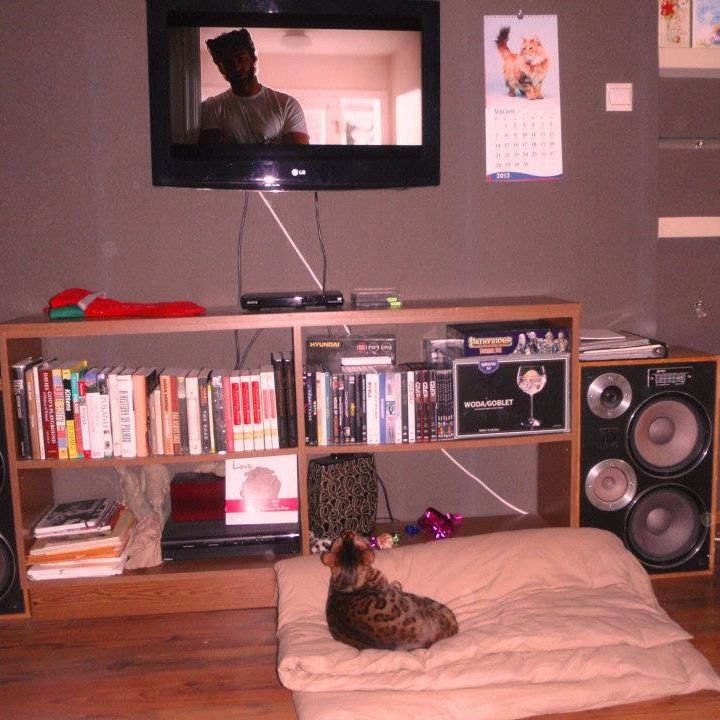 |
- Hugh Jackman. See accompanying photo of Kuma watching X2 in our apartment in Lublin, Poland. Maybe he just knew that a few years later, his human mother would be teaching on the university campus that houses the X mansion. Whatever the reason, he’s spellbound when Jackman is on screen. I think a lot of us can sympathize.
- Russian composers, specifically Tchaikovsky, Stravinsky, Shostakovich, and Prokofiev—but not, oddly enough, the zoophilous Peter and the Wolf (he’s more a Romeo and Juliet cat). Frankly, I was disappointed because I listened to a ton of Chopin while I wrote The Snow Queens, and I noted that Kuma couldn’t care less about that most beloved of Polish artists. But if I play anything by the above Russians, he comes and sits by the computer, listening quietly. And Kuma is not a quiet cat.
Decolonizing Writing Practice, Part III
In July 2016, I held an event with my friend Alberto Albuquerque at the Intercultural Center, which he runs with aplomb, at Yamanashi Gakuin University. I was teaching at the International College of Liberal Arts, a department within Yamanashi Gakuin. Alberto and I hosted a butoh salon, complete with a screening of footage from Hijikata Tatsumi’s Revolt of the Flesh (Nikutai no hanran) from 1968, a performance by a local American who had studied the dance form, a display of photos and books about some of the most prominent butoh dancers and choreographers, and lots of conversation. (I included a photo of the event above, with my lovely creative writing student Samantha front and center.) When some people in the audience, including the brave young performer, learned that I had studied with Ohno Kazuo in the 1990s and published a novel that focused in large part on butoh, I was sweetly treated as the doyenne of the group. Continue reading
Decolonizing Writing Practice, Part II
September 2019
First, I wanted to share a link to my fourth and most recent essay for Electric Literature, “How Women Writers Are Reinventing Freud”.
And here is the second part of my essay on the subject of decolonizing writing practice:
In December 2015, I experienced one of my most humbling hours as an educator to date. In a glass building at the International College of Liberal Arts in Kofu, Japan, I delivered a lecture on atomic bomb literature to a group of 30 students from a prestigious girls’ high school in Hiroshima. This audience was the most engaged I’ve ever had; when I asked a question, 30 hands shot up. Still, I was terrified: I was an American giving a lecture on the writings of Hara Tamiki and Ibuse Masuji to young Japanese women from the first of the two cities to be bombed by the United States. The vectors of national tensions in that sunlit room could have strangled my speech.
I delivered the first part of my lecture in Japanese. The students and I then compared a text by Hara, who was a hibakusha, or a survivor of the bombings, to one from Black Rain by Ibuse, who did not endure Hiroshima’s bombing personally but instead relied on secondhand accounts to compile his narrative. Near the end of the lecture, I asked a question: Should non-hibakusha be allowed to write about the event? Almost all of the students said “yes.” A single girl said “no,” but firmly.
Her “no” haunts me. And in an age in which many people are strenuously objecting to actresses portraying people of different races and genders—hello, Scarlett Johansson—I think it’s time to ask the question: Who is allowed to write what? Continue reading
Decolonizing Writing Practice
In the fall, I’ll be teaching an online course for the first time. The subject is Academic Writing Across Disciplines, and five of my students will be from Nunavut, a land I can barely imagine. In June, I was fortunate enough to meet these students, along with their program coordinators, here in Greater Victoria. How alien their landscape would be to me was underscored by this brief exchange:
Another instructor: [apropos a discussion on accessing readings] They can download required readings from the website and then go read them under a tree.
Program coordinator: Except that there are no trees in Nunavut.
My mind was blown. Continue reading
Kaimami/Kage
I wrote this piece in honor of Dr. Kacem Zoughari, a martial arts practitioner with whom my husband
has studied. His Japanese martial art relies on moving in the shadows, while much of the Japanese literature I studied plays with the concept of voyeurism
and revelation.
This short essay attempts to flesh that difference.
Literature is predicated on what may be revealed, your art on what can be hidden. On how to hide.
I first fell in love with Japan in The Tale of Genji’s jeweled pavilions. Its
narrative pivots on kaimami (垣間見 revelation through stolen glimpses). A lustful man spies a fall of hair behind a screen. Fireflies illuminate beauties in dark rooms. Cats and wind push aside curtains to flash, for a few seconds, a face, the flicker of fate that becomes a memory, a reason to live. Continue reading
Artifact: An Essay I Wrote in Seventh Grade
A dear friend of mind, Patience Ciufo, currently teaches at a Florida middle school with a talented and dedicated educator named Leslie Kingsley. Years ago, Leslie was the Language Arts teacher for the gifted program at Stuart Middle School, and she taught us in several subjects over the years and ended up being one of the most important and supportive teachers I ever had.
Why I Forgive Jane the Virgin for Making a Writer Its Main Character
I’m happy to say that I’ve been publishing a lot of essays in various publications over the past couple of months! Readers might enjoy these:
“Suicide Contagion and the Risks of Literature,” which considers whether creative writers, like journalists, should refrain from using certain phrases when talking about suicide, was published in The Coil:
https://medium.com/the-coil/suicide-contagion-and-the-risks-of-literature-cynthia-gralla-413f0e3fe483?source=friends_link&sk=21d1a546348e33bf333212f8b6439628
On a lighter note, “9 Fashionable Books That Make Clothes a Main Character,” a list that looks at how sartorial style functions in narratives like The Tale of Genji, The Neapolitan Novels, and The Collected Schizophrenias, ran in Electric Literature:
https://electricliterature.com/9-fashionable-books-that-make-clothes-a-main-character/
And if you want to find dark humor in psychotherapy, “Case Study of a Psychiatrist in the Freudian Style,” published by The Satirist, might make you feel better as it satirizes the Freudian case study and the power dynamics of prescription drug therapy:
https://www.thesatirist.com/satires/case-study-of-a-psychiatrist-in-the-freudian-style.html
And now for May’s essay . . .
Continue reading
Dream Girls Gotta Have Agency
Below is a link to my essay, “Dream Girls Gotta Have Agency,” which was recently published in Electric Literature. This essay was so much fun to write because it gave me a chance to draw on my graduate school training in literature in English, Japanese, and Spanish. While it centers on the trope of the sleeping beauty in literature, it ranges widely, touching on everything from biases in mental health care to Kawabata’s fetish for female arms and fingers and my experience as a bar hostess in Japan.
Continue reading
How to Talk to Someone with a Chronic Illness
I don’t typically pen do-and-don’t lists, but in writing Chronic, I thought a lot about how we talk to sick people, particularly the blame and biases encoded in our words. That reflection inspired this list.
Don’ts:
Don’t rush to tell her, “You lost so much weight! You look great!” If the person lost that weight due to serious illness, this compliment, while well-intentioned, sounds weird. Also, equating beauty with extreme thinness is always a bit perilous, no?
Don’t ask, “What did you do to get X disease?” That question sounds like you’re blaming the victim. “Do researchers know what causes it?” might work better.
Please don’t give ludicrous dietary advice or promise miracles if your friend changes her eating habits. You know, “I cut out gluten, and if you do it too, I bet your X will go away.” This one’s a particular pet peeve of mine.
Don’t ask, “Are you better yet?” There is no “yet” with a chronic disease. A more constructive formulation: “How do you feel now?” or “Is your disease currently under control?”
“You don’t look sick” is a double-edged sword. On the one hand, most people enjoy hearing that they look healthy, as our beauty ideals are tied up with “looking healthy.” But if you say this in the wrong tone, it can sound accusatory. Especially in the work place, where it might seem like you’re leveling a charge of malingering, please use with caution.
Don’t say, “At least you don’t have terminal cancer/other horrible disease.” Your friend already understands that in theory, things could be worse. Things could always be worse. But your friend doesn’t need to feel guilty for her concerns or anxieties.
Above all, though, don’t avoid your friend or loved one for fear of not saying the right thing. It’s better to try and stumble than to shun someone at the moment she needs you most.
Dos:
If you know someone with the same disease who is thriving, please share the story. It can give your friend a lot of hope.
Do tell your friend she’s beautiful if she’s undergoing cosmetic changes like hair loss due to a disease. Focus on the positive. If she asks for advice, feel free to give it, but I wouldn’t start off with, “Wow, you’ve lost a lot of hair. Why don’t you get a wig or scarf?”
Do ask, if you’re inviting her over to your house or out for dinner, “Is there anything you can’t eat?”
Do help her to face the future with optimism. Comments like “Your life will be really hard” are never productive. It’s more generous to say something like, “You’re a really strong person, and I admire how you face your illness.”
Do understand that many chronic diseases have periods of remission and flares. If your friend enjoys a long period of remission, you may be surprised if she eventually gets sick again. You may even feel a sense of frustration—at life, the disease, or even her. And that’s fine as long as you keep it to yourself.
Do express love, support, and empathy—always. This is the best way to make your friend feel better.
Copyright © Cynthia Gralla, 2019
The Hidden Foreigner
I recently became a permanent resident of Canada. For the past year and half, I’ve lived in Victoria, the capital of British Columbia, on Vancouver Island—meaning that 97% of my non-Canadian friends and relatives think I live in Vancouver, despite my many protestations to the contrary.
Recently, I bumped into a man in a local store and apologized. He pointed out that this self-reflexive politeness was what made us Canadians. It struck me that this man would have no way of telling, based on casual observation, that I wasn’t one of his people. My infiltration of Canada is stealthy, given that I am a Caucasian of Eastern European extraction and look similar to most people here. In fact, because I have to avoid direct UV rays due to a diagnosis of systemic lupus, I am even paler than the average Canadian. Which is saying something. Continue reading
A Committed Dancer
Vaslav Nijinsky was diagnosed with schizophrenia and involuntarily committed to a mental asylum in 1919. He spent the remaining three decades of his life in and out of institutions.
In the early months of 1919, as his psychotic break became impossible for those around him to ignore, Nijinsky kept a diary. He filled it with drawings of eyes and repetitive, rhythmic passages, like this one in which he obsesses over his former lover and boss Serge Diaghilev, the founder of the Ballets Russes: “Diaghilev thinks he is the God of art. I think I am God. I want to challenge Diaghilev to a duel so that the whole world will see. I want to prove that all Diaghilev’s art is sheer nonsense. If people help me, I will help them to understand Diaghilev. I worked with Diaghilev for five years without respite. I know all his tricks and habits. I was Diaghilev.”
What might his diary have looked like twenty years later? Continue reading
Top Ten Favorite Metaphors of 2018, Part II Plus My Ten Favorite Books of the Year
Once again, in no particular order, some of the images and passages that thrilled my blood this year:
- “But there was nonetheless a spirit of at least intermittent optimism that refused entirely to die in Marin, perhaps because Marin was less violent than most of the places its residents had fled, or because of the view, its position on the edge of a continent, overlooking the world’s widest ocean, or because of the mix of its people, or its proximity to that realm of giddy technology that stretched down the bay like a bent thumb, ever poised to meet the curved finger of Marin in a slightly squashed gesture that all would be okay.” – Mohsin Hamid, writing about Marin and the South Bay in Exit West
- “And no, it is not fate, I said, because Google watches over us like God . . . How is democracy supposed to work if you get only what you’ve already searched for and if you are what you search, and you never feel alone or you always do, since you never get the chance to meet the others, who are not like you, and that’s how it is with the search, you come across like-minded people, God googles our paths, so that we stay put in our grooves, I always meet people who are looking for the same thing I am, I said, and that is why we, too, have met here, and the old man said, This is the very meaning of fate. He was obviously further along in exegesis than I.” – Katja Petrowskaja, Maybe Esther
This book is so fucking brilliant that I might hate the author if I didn’t love literature so much. This passage reads like a mating of W. G. Sebald and Rachel Cusk, but the book is entirely on its own terms.
Continue reading
What Poland’s Flying University Can Teach Us about Teaching in the Trump Era
The day after Trump was elected, I taught a class on creative writing at the International College of Liberal Arts in Kofu, Japan. While none of my students was American, most felt devastated by the outcome. We talked about what might change. At the time, I was concerned about racism, immigration policies, and health care. But I couldn’t see what should have been obvious to me: that the ascension of the far right, in America and elsewhere, would have consequences for education.
Continue reading
